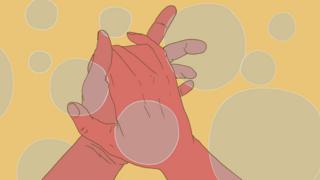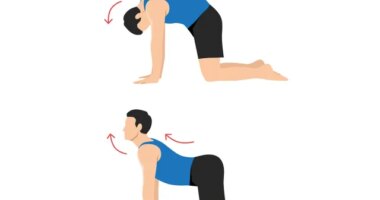 Image copyright Emma Russell
Image copyright Emma Russell Coping with a life-long phobia of germs meant the BBC’s Peter Goffin was ready for the coronavirus pandemic. He knew how to observe hygiene rules, and he had the skills needed to prevent his anxieties growing out of control.
I was sitting on my kitchen floor, using disinfectant to wipe down a bag of cereal, when I had a revelation: I’ve spent almost 20 years practising for the coronavirus pandemic.
In my early teens, I was diagnosed with Obsessive Compulsive Disorder (OCD). For nearly two-thirds of my life, I’ve agonised over germs, how they can be transferred, and how I can keep them at bay. And that puts me ahead of the curve when it comes to the types of precautions the world is now being told to observe.
Avoiding physical contact with people outside my household, washing my hands after touching anything that anyone else has touched, disinfecting groceries when I bring them back from the supermarket – I’ve done them all, at various points in my life. And I’ve perfected my technique.
I recognise a lot of my own tendencies in the new global culture of coronavirus. But what I recognise most of all is the constant, unquenchable anxiety that comes from never really being satisfied that you’re safe from infection.
Thousands, maybe millions of people around the world are now asking themselves:
“Did that person in the shop get too close to me?”
“Did I wash my hands for long enough?”
“Will this soap kill all the germs?”
In the mid-19th Century, French doctors writing early studies of OCD called it la folie du doute – the madness of doubt. That’s the best description I’ve ever seen for the way that I’ve felt in my darkest moments. And many of us seem to be experiencing something like it now, in the face of the pandemic.
We may be pretty sure that if we maintain distance, and wash our hands, and follow the lockdown rules, we can protect ourselves. But there’s always that nagging bit of uncertainty and doubt, and the anxiety that comes with it.
These aren’t inherently bad feelings. In small doses, they’re what keep us vigilant.
The problem is, they can spiral out of control. As I know all too well, the doubt starts as, “Am I clean enough?”
But grows into, “Will I ever be able to have a normal life again?”
And ultimately, “Why even try?”
Growing up in Canada, I had problems controlling worry and fear from a very young age – maybe five or six. By the time I was 12, those feelings had narrowed, mostly to concerns about cleanliness and contamination, especially with regards to other people’s bodily fluids: spit expelled when they speak, germs spread when they don’t wash their hands after using the toilet, and all the dangerous bacteria that I imagined were lurking all around me.
Eventually my family noticed I was trying to avoid touching things like door knobs and light switches, and scrubbing my hands red-raw.
I was fortunate to have accepting and supportive parents, who always had a sympathetic ear to lend, and who helped me navigate the often confusing and bureaucratic mental healthcare system. I got into therapy and was prescribed anti-depressants, which I take to this day.
These treatments, and the OCD itself, just became parts of what I considered my normal life. But they did disrupt my teens and early 20s in a major way. When I got home from my lessons at high school and university, I was more concerned with washing off the day’s germs than with studying. There were times I stayed up all night doing laundry or showering a second or third time because I just couldn’t get “clean enough”. I kept a lot of friends at a distance, partly because I was worried about contamination – but mostly because I was terrified they would discover I was different from them.
In the past five years or so, I’ve got my OCD anxieties mostly under control. I’ve become more diligent about confronting and fighting my fears. I try hard to differentiate between helpful worries, and worries that are unnecessary or overblown. I’ve benefited immensely from having a patient and understanding partner, who holds me accountable when I need it most.
Anecdotally, many people with pre-existing anxiety or germ issues have said they are experiencing less worry during the pandemic. Maybe because other people have adopted their worldview, are taking the same precautions, and are also now learning to manage high stress on a regular basis.
This is true for me, to some extent. But the pandemic has also thrown up – or revived – some unique challenges for me. Public health warnings have reinforced the fact that germs are easily transferred from person to person, even as we pass each other in the street. Hand-washing guidance has made me wonder how often I’ve left the sink without truly being clean. And groceries have presented one of the great re-emerging problems of my life.
Wasteful though it may be, I’ve always preferred to buy packaged food instead of loose items that may have been pawed by other people. But beyond that, I’m relatively unconcerned about my food. In the midst of coronavirus, though, I’ve returned to the extreme caution I used at the peak of my mental health problems about a decade ago.
Now, when I bring my groceries home from the shop, I set them all down in a little-used corner of my flat, the same way I might carefully set aside a pair of shoes after stepping on a discarded plaster or a wad of chewing gum. I wash my hands. Anything that can be shaken free from its protective packaging, I set aside – confident it’s clean enough already. Then, methodically, I clean the remaining items with household disinfectant or washing up liquid and water, placing the finished ones down in a new pile. I wash my hands again, and put my purchases in the cupboard or fridge. None of these are new habits, but they’re ones I hoped I had buried forever.
And I’m not the only one experiencing new, or more intense, mental health troubles.
Around the world, crisis counselling phone lines have reported a drastic increase in calls since the pandemic began. In the US, some professionals have warned the mental health care system does not have the capacity to keep up with growing demand. And that’s to say nothing of countries with even less developed systems of care.
As the discussion surrounding coronavirus turns more and more to easing the lockdowns, keeping a cool, calm head may be more important and more challenging than ever. No matter how soon the shops and offices and schools start to re-open, the spectre of Covid-19, and all the fears and anxieties that go with it, are bound to hang over the world for months to come.
But, as I’ve learned from years of self-examination and multiple stints of therapy, anxiety can be controlled.
In my experience, it’s been incredibly helpful to talk about my feelings calmly and openly with people I trust, whether they’re a qualified professional or a loved one.
I’ve undergone a form of treatment called Cognitive Behavioural Therapy, first in Canada as a teenager and again in the UK as an adult. The purpose of this fixed-term counselling is, essentially, to give patients the skills they need to recognise, challenge and replace thoughts or actions that have stretched beyond the logical or helpful, and into the realm of harm or disruption.
It’s best to learn CBT with the help of a professional counsellor. But there are elements of the technique that could be tried on your own, and might be helpful to anyone. Like making a list of all the things that are worrying you, detailing in each case why you’re worried and how it makes you feel. Then you can look at the list, and try to come up with fact-based reasons why some of your worries may be unfounded, exaggerated, or solvable.
For people under lockdown, anxiety could be a complex mix of health concerns, lost income or job security, social isolation, and missing out on the more joyful aspects of life. By identifying each of those worries individually, you may decide you can mitigate some of the stress – fighting isolation by scheduling regular video calls with family or friends, for instance. Or planning a big summer holiday or party for whenever the world has safely opened back up.
You might find solace in the advice of experts, who have emphasised that the majority of people who contract Covid-19 will survive it. You might be relieved by scientific evidence that regular hand soap or washing up liquid is enough to clean your skin, and doing your laundry in the usual way will remove the virus from your clothes.
Above all else, you must remember that none of us are experiencing this pandemic alone.
On my worst days, my doubt and anxiety can grind my self-esteem into a fine powder. I see myself as strange and foolish, like I’m the only person on Earth feeling the way I do. But, right now, we all feel the strain of coronavirus in one way or another.
We may be self-isolating to get through this crisis. But we’re doing it together.
More about mental health:
If you or someone you know needs support for issues about emotional distress, these organisations may be able to help.
Source: BBC News – Health









